
Bernadeth Atrinindarti
MAppSc (Advanced Nutrition Practice)
In this article on plant-based and omnivorous diets, we look at the studies and research done on:
- Cognitive health
- Diabetes risk
- Gastrointestinal health
- Micronutrient intake
- Urinary health
We tried our best on understanding what kind of foods individuals in these group trials were consuming, since, as an example — healthy plant-based diet and less healthy-plant based diet, doesn’t reveal much information.
Nonetheless, we persisted in our research for this article, and we hope that you’ll learn new details about these two types of diets.
Cognitive health
The impact of plant-based diets and omnivorous diets on cognitive health is an area of ongoing research. While both diets can contribute to overall brain health, plant-based diets have been related to several factors that may promote cognitive well-being.
A well-planned diet can provide a rich array of nutrients that support brain health.
For example, certain antioxidants found in plant foods, like flavonoids, have been linked to improved cognitive performance and a reduced risk of age-related cognitive decline.
A study by Chan et al. was looking at the impact of different dietary patterns to cognitive impairment in Chinese older women in Hong Kong.[1] The participants were divided into three categories:
- “vegetables-fruits” dietary pattern, which was rich in vegetables, fruits, soy products and legumes
- “snack drinks-milk products” dietary pattern, which was a mixture of healthy and unhealthy food groups including fast food, sweets and desserts, nuts, milk products and whole grains
- “meat-fish” dietary pattern, which included frequent intake of meat, fish and seafood
The result showed that the participants with “vegetable-fruits” dietary pattern tend to reduce risk of cognitive impairment. Furthermore, the study also reported no association of “meat-fish” pattern with risk of cognitive impairment in women.
Antioxidants in fruit and vegetables can improve cognitive performance
Another study was looking at the association between plant-based diets with lower dementia risk. The study was a prospective cohort study, thus the participants recruitment started in 2005 and followed until the end of 2014. Participants were categorised into two groups:
- vegetarian (no meat, fish or poultry), and
- non-vegetarian (no restriction)
The result showed that individuals following a plant-based diet (vegetarian) reduced the risk of dementia compared to non-plant-based individuals (non-vegetarian).[2]
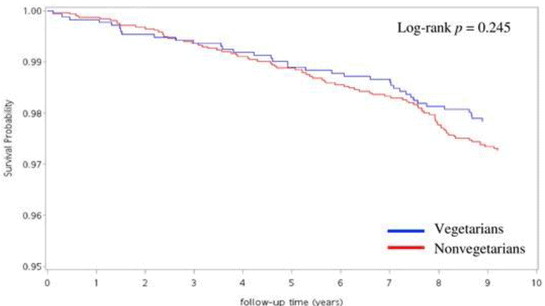
If you are interested in how particular nutrients affect our brain, such as sugar/carbohydrates, fats and protein, we have several articles on this topic, titled Diet and the Brain.
I would suggest starting with Diet and the Brain – Proteins (cognition and brain performance).
Diabetes risk
Plant-based diets, especially those emphasising whole grains, legumes, fruits, vegetables and healthy fats like nuts and seeds, have been known to reduce the risk of developing type 2 diabetes compared to omnivorous diets.
RELATED — Diabetes: Early Signs, Causes, Types and Treatment
Plant-based diets are typically rich in fibre, which slows down the absorption of sugars and can help stabilise blood sugar levels.
Additionally, plant-based diets, if done correctly, tend to be lower in processed foods and added sugars, which can contribute to better blood sugar control.
A study by Kahleova et al. was looking at the effect of a plant-based diet on insulin resistance, visceral fat and oxidative stress markers in individuals with type 2 diabetes.[3]
The result showed that after 24 weeks of following a plant-based diet, there was a significant increase in insulin sensitivity, a reduction in visceral fat, and an increase in oxidative stress markers.
The significant loss of visceral fat and improvements in oxidative stress markers might be responsible for promoting insulin sensitivity.[3]
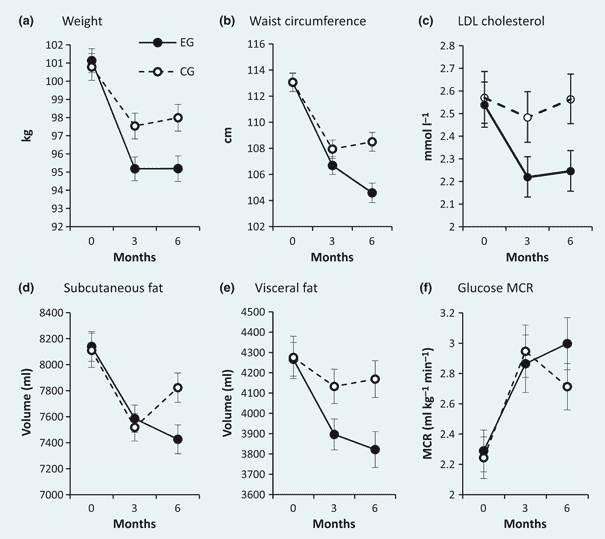
Experimental group (closed circles/solid line), received a vegetarian diet, and control group (open circles/dashed line) received a conventional diabetic diet.
Another study comparing individuals following plant-based diets and omnivore diets reported that individuals that followed plant-based diets had a lower glycemic index and glucose concentrations.[4]
In addition, a study by Li was looking at the effect of different diet approaches on non-communicable disease. The study showed that the incidence of type 2 diabetes were significantly higher in omnivores compared to vegetarians.
However, vegetarians have a number of increased risk factors for other non-communicable diseases which are associated with inadequate intake of vitamin B12 and n-3 polyunsaturated fatty acids (PUFA).[5]
Gastrointestinal health
Plant-based diets are generally higher in fibre compared to omnivorous diets. Fibre plays a crucial role in maintaining gastrointestinal health by:
- promoting regular bowel movements
- preventing constipation
- supporting healthy gut microbiota
The gut microbiota plays a vital role in digestion, nutrient absorption, immune function and overall gastrointestinal health. Plant-based diets provide prebiotic fibres that serve as food for beneficial gut bacteria, promoting growth and diversity.
Fibre is important for gut health
Plant-based diets also can be beneficial for individuals with specific food intolerances or sensitivities. By avoiding certain animal products, such as dairy or eggs, individuals with lactose intolerance or egg allergies can reduce their symptoms and improve gastrointestinal comfort.
Fiber also plays a crucial role in irritable bowel syndrome (IBS) symptoms.
Some people with IBS have constipation (infrequent bowel movements) and need high-fiber foods, others have diarrhea (frequent, loose stools) and need a low-fibre diet, and some people have both. Appropriate food choices are important to manage IBS symptoms effectively.
A study by Zimmer et al. reported that microbial counts of four bacteria including Bacteroides, Bifidobacterium, E. coli and Enterobacteriaceae were significantly lower in the plant-based group compared to the control group consuming ordinary omnivorous diet.
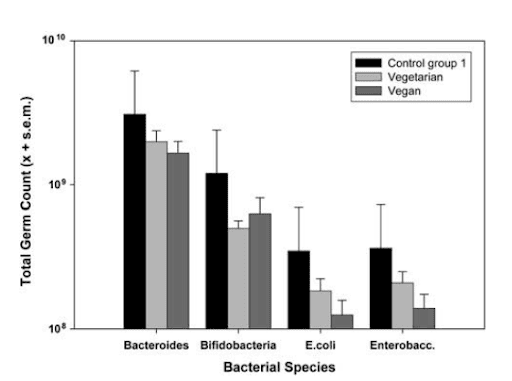
These bacteria can be associated with infections and diseases such as urinary tract infections and foodborne illnesses.
Enterobacteriaceae was associated with the severity of Parkinson’s disease symptoms, such as postural instability and gait difficulty.[6]
Micronutrient intake
Plant-based diets and omnivorous diets can differ in their micronutrient profiles. Omnivorous diets generally provide more sufficient vitamins and minerals due to the variety of food the individual is able to consume.
Omnivorous diets generally provide more sufficient vitamins, minerals and essential amino acid including:
- vitamin B12
- Calcium (for healthy bones, teeth and heart)
- omega-3 fatty acids
- Zinc (for immunity, skin health and libido)
- iodine
- heme iron
- leucine
- lysine
- sulfur-containing amino acid (methionine and cysteine)
Those vitamins, minerals, and amino acids can only be obtained from animal-based foods and/or rich in animal-based food.
A study indicated that serum vitamin B12 levels are deficient in 78% of the individuals following plant-based diets, compared to 0% in omnivores.[7]
78% of individuals on plant-based diets might be deficient in vitamin B12
Another study was compiling data of nutrient intake and status in adults consuming plant-based diets compared to meat-eaters.
The result showed that intake and status of vitamin B12, iron, zinc, iodine, calcium and vitamin D, were generally lower in plant-based dietary patterns compared to meat-eaters.
RELATED — Vitamin D: The sunshine hormone for stronger bones
On the other hand, meat-eaters were at risk of inadequate intakes of fibre, polyunsaturated fatty acids (PUFA), folate, vitamin D, E, calcium and magnesium.[8]
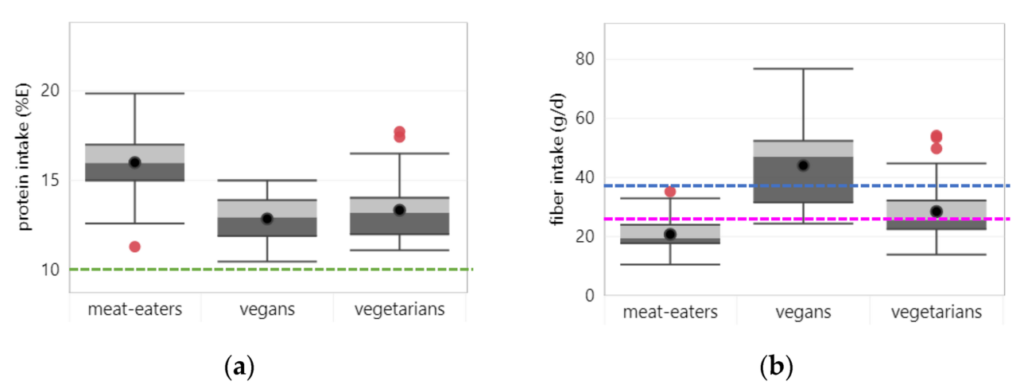
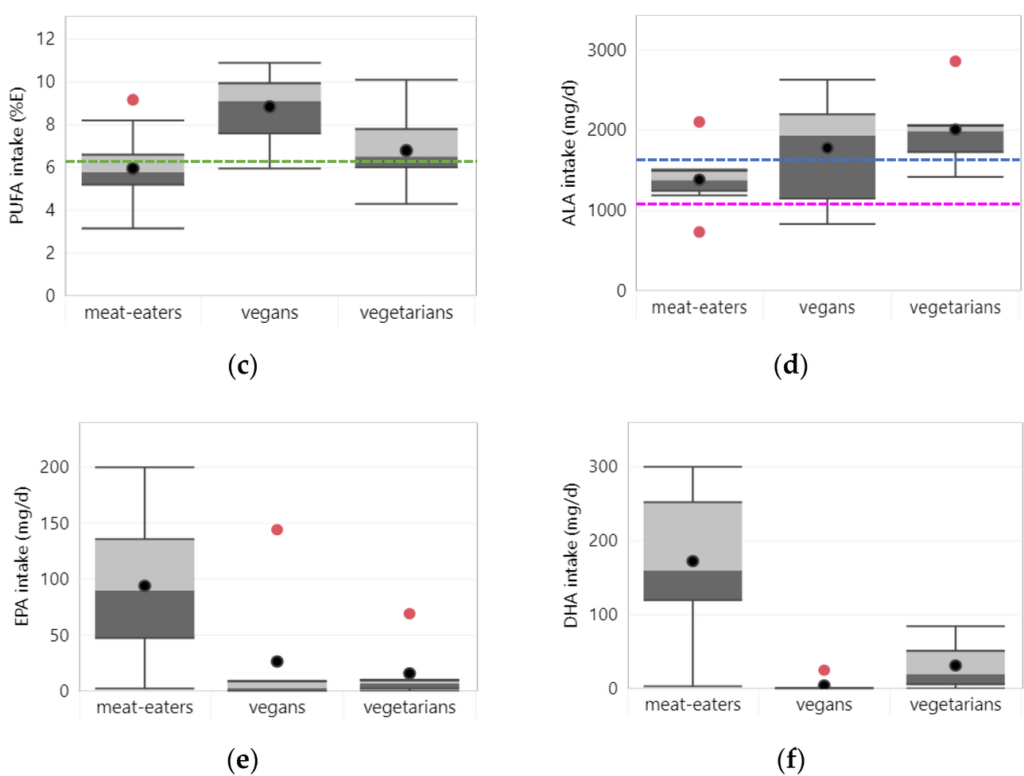
Individuals following plant-based diets, particularly strict vegan diets, may need to pay closer attention to specific nutrients and consider supplementation or fortified foods to ensure adequate intake.
Urinary health
Plant-based diets, especially those rich in fruits and vegetables, tend to have an alkalizing effect on urine pH.
This may be beneficial for individuals who are prone to certain urinary conditions, such as uric acid stones, as an alkaline urine pH can help prevent their formation.
Chronic kidney disease
A study by Kim et al. was looking at the incident of chronic kidney disease (CKD) and kidney function in different types of plant-based diets. Diets were characterised into four plant-based diet:
- overall plant-based diet
- healthy plant-based diet
- pro vegetarian diet
- less healthy plant-based diet
This study showed that higher adherence to a healthy plant-based diet and a pro vegetarian diet were related with a lower risk of CKD.
On the other hand, higher adherence to a less healthy plant-based diet was associated with elevated risk of CKD. Furthermore, higher adherence to overall plant-based diet and a healthy-plant based diet was associated with slower kidney function decline.[9]
A study by Siener and Hesse were looking into the effect of a vegetarian and different omnivorous diets on urinary risk factors for uric acid stone formation.[10]
The participants were characterised into four groups:
- self-selected meat-containing diet (SD)
- ovo-lacto vegetarian diet (VD)
- omnivorous diet (OD)
- Western type diet (WD)
The results indicated that the intake of a balanced plant-based ovo-lacto vegetarian diet resulted in a lower risk of uric acid crystallisation compared to the other diet groups.
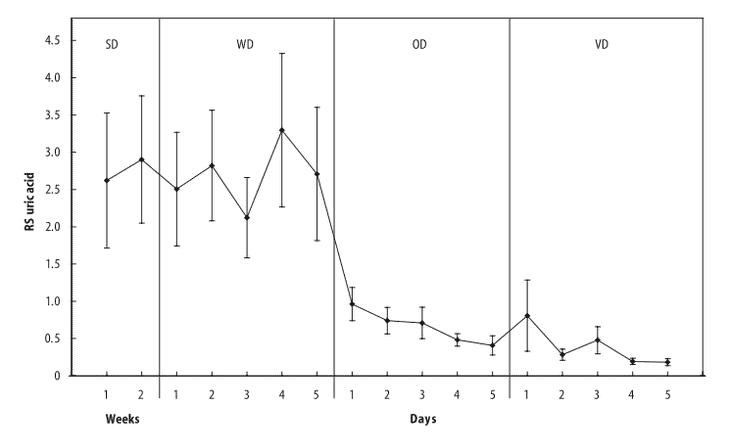
Urinary tract infections
Urinary tract infection (UTI) is caused mainly by increasing E. coli infection via the intestine-stool-urethra route.
Individuals who follow plant-based diets are shown to have lower total counts of E. coli and Enterobacteriaceae spp. and lower stool pH to prevent the growth of E. coli and Enterobacteriaceae spp.
This result may contribute to the protection from UTIs. A study by Chen et al. reported that plant-based diet help to reduce the risk of developing UTI by 16%.[11]
Related Questions
1. Can a low carbohydrate diet help with managing diabetes?
The evidence shows that a low-carb diet can be safe and effective in helping people with type 2 diabetes, since it can assist in managing their weight, blood glucose (sugar) levels, and risk of heart disease in the short term.
However, it can affect growth in children. Furthermore, there is still little evidence of the benefits of this diet in people with type 1 diabetes.
2. Can oxalates from plant-based foods cause kidney stones?
Most kidney stones are made from calcium oxalate.
Certain foods including:
- leafy greens
- legumes
- nuts
- milk alternatives
are high in oxalates.
3. Are there any anti-nutrients in certain plants that I should be aware of?
There are several anti-nutrients that people should be aware of, including:
- Glucosinolates and goitrogens (broccoli, brussels sprouts, cabbage, kale), which interfere with the absorption of iodine (impact on thyroid function and cause goiter)
- Lectins in legumes (beans, peanuts, soybeans), which can interfere the absorption of calcium, iron, phosphorus and zinc
- Oxalates
- Saponins (legumes and whole grains), which can interfere with normal nutrient absorption
- Tannins (tea, coffee and legumes), which can decrease iron absorption
- Phytates / phytic acid (whole grains, seeds, legumes, some nuts), which decrease the absorption of iron, zinc, calcium and magnesium
RELATED — Magnesium (for a great night of sleep)
4. How do I remove or minimise the anti-nutrients in certain plants?
Many anti-nutrients like phytates, lectins and glucosinolates can be minimised by sprouting, soaking or boiling before eating.
However, another strategy could be altering the timing of eating foods with anti-nutrients.
5. Can too much fibre in the diet cause diverticulitis?
Decreasing the fibre in our diet could help reduce the irritation in diverticulitis.
When you have diverticulitis, the polys are inflamed and maybe infected. For milder cases it is recommended to eat a low-fiber diet.
If you are looking to read the previous article, you can find it here — The Healthiest Diets: Plant-based Diet vs Omnivorous Diet (Part 1).
Bernadeth’s passion in cooking, food and health led her to learn more about nutrition and the importance of functional foods. Throughout the years, she gained special interest in sports and performance nutrition, and the varieties of diets around the world. As a nutritionist, Bernadeth’s goal is to encourage a healthy-balanced diet and share the evidence-based nutrition knowledge in order for people to live healthier and longer lives.
Bernadeth is a part of the Content Team that brings you the latest research at D’Connect.
References
(1) Chan, R., Chan, D. & Woo, J. A cross sectional study to examine the association between dietary patterns and cognitive impairment in older Chinese people in Hong Kong. J Nutr Health Aging 17, 757–765 (2013). Retrieved from https://doi.org/10.1007/s12603-013-0348-5
(2) Tsai, J.-H., Huang, C.-F., Lin, M.-N., Chang, C.-E., Chang, C.-C., & Lin, C.-L. (2022). Taiwanese Vegetarians Are Associated with Lower Dementia Risk: A Prospective Cohort Study. Nutrients, 14(3), 588. MDPI AG. Retrieved from http://dx.doi.org/10.3390/nu14030588
(3) Kahleova, H., Matoulek, M., Malinska, H., Oliyarnik, O., Kazdova, L., Neskudla, T., Skoch, A., Hajek, M., Hill, M., Kahle, M., & Pelikanova, T. (2011). Vegetarian diet improves insulin resistance and oxidative stress markers more than conventional diet in subjects with Type 2 diabetes. Diabetic medicine : a journal of the British Diabetic Association, 28(5), 549–559. Retrieved from https://doi.org/10.1111/j.1464-5491.2010.03209.x
(4) Goff, L. M., Bell, J. D., So, P. W., Dornhorst, A., & Frost, G. S. (2005). Veganism and its relationship with insulin resistance and intramyocellular lipid. European journal of clinical nutrition, 59(2), 291–298. Retrieved from https://doi.org/10.1038/sj.ejcn.1602076
(5) Li, D. (2014). Effect of the vegetarian diet on non-communicable diseases. Journal of the Science of Food and Agriculture, 94(2), 169-173. doi:https://doi.org/10.1002/jsfa.6362
(6) Zimmer, J., Lange, B., Frick, J. S., Sauer, H., Zimmermann, K., Schwiertz, A., Rusch, K., Klosterhalfen, S., & Enck, P. (2012). A vegan or vegetarian diet substantially alters the human colonic faecal microbiota. European journal of clinical nutrition, 66(1), 53–60. Retrieved from https://doi.org/10.1038/ejcn.2011.141
(7) Krajčovičová-Kudláčková, M., Blažíček, P., Kopčová, J., Béderová, A., & Babinská, K. (2000). Homocysteine Levels in Vegetarians versus Omnivores. Annals of Nutrition and Metabolism, 44(3), 135-138. doi:10.1159/000012827
(8) Neufingerl, N., & Eilander, A. (2021). Nutrient Intake and Status in Adults Consuming Plant-Based Diets Compared to Meat-Eaters: A Systematic Review. Nutrients, 14(1), 29. Retrieved from https://doi.org/10.3390/nu14010029
(9) Kim, H., Caulfield, L. E., Garcia-Larsen, V., Steffen, L. M., Grams, M. E., Coresh, J., & Rebholz, C. M. (2019). Plant-Based Diets and Incident CKD and Kidney Function. Clinical Journal of the American Society of Nephrology : CJASN, 14(5), 682-691. Retrieved from https://doi.org/10.2215/CJN.12391018
(10) Siener, R., & Hesse, A. (2003). The effect of a vegetarian and different omnivorous diets on urinary risk factors for uric acid stone formation. European Journal of Nutrition, 42(6), 332-337. doi:10.1007/s00394-003-0428-0
(11) Chen, Y.-C., Chang, C.-C., Chiu, T. H. T., Lin, M.-N., & Lin, C.-L. (2020). The risk of urinary tract infection in vegetarians and non-vegetarians: a prospective study. Scientific Reports, 10(1), 906. doi:10.1038/s41598-020-58006-6






